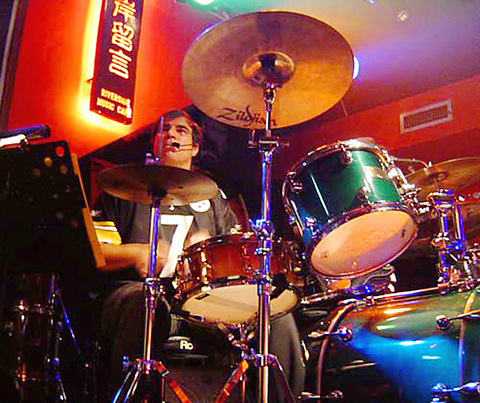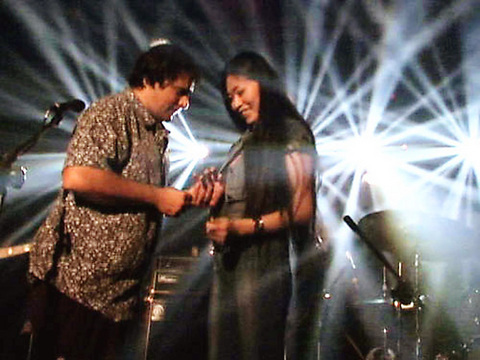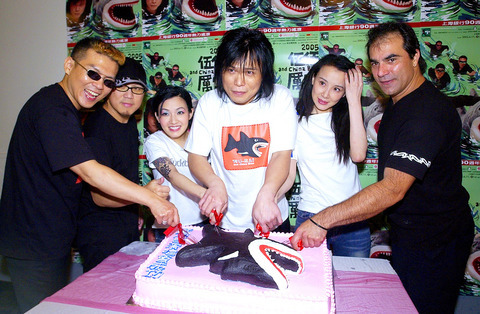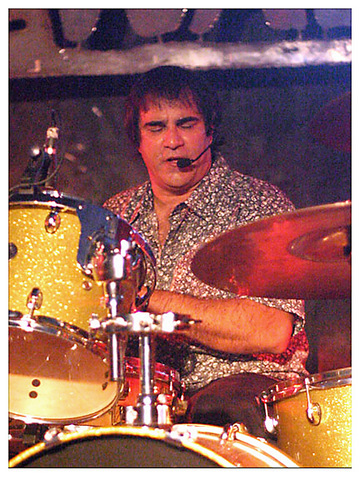"In the early days when I was in high school, I couldn't afford my own drum set, so the other kids who had drum sets had me come over and play." Dean "Dino" Zavolta, drummer for China Blue, speaks with the self-assured modesty and quiet confidence -- rare characteristics among professional musicians and rock stars -- of a man who rose from humble beginnings to make his living, a very good one, out of his passion.
The nation's "King of rock" Wu Bai (伍佰) and his band are revered by legions of fans across generations and countries in the Chinese-speaking world. Their
latest album Two Faced Man (雙面人) was nominated in this year's Golden Melody Award's Best Album category and their album The End of Love (愛情的盡頭) (1996) sold over 600,000 copies. That's just a snippet from a 15-year-old rock resume that would exhaust even the most avid reader.

PHOTOS: TAIPEI TIMES AND COURTESY OF DINO ZAVOLTA
Genes may have played a role in Zavolta's rise through the ranks of musicians; his father played drums, his mother sang and his uncle played guitar.
"My first band was ... a trio. I sang. We split up because I wanted to go out and do some professional work and earn some money. So I joined an oldies but goodies band, a 1950s and 1960s-style band playing The Drifters, The Temptations," Zavolta said.
On the side he made extra money working as a carpenter. He auditioned for a rock band that played covers, a gig that was to become professional. But originality beckoned and the third-generation Italian-American who was born in 1962 and grew up in California found a band to play showcases.

"We had to pay to play, and then the [venue] owner would give us a cut of the profits, off the door or whatever, and we would split it four or five ways. We were doing Orange County and I met No Doubt and Sublime," Zavolta said. "After I went to Taiwan these guys got big, they got into the mainstream. I had second thoughts: Maybe if I hadn't gone to Taiwan things would have been different."
Zavolta first came to Taiwan with a band called Motif on a six-month contract between 1988 and 1989. After his contract finished he returned to the US.
"Those six months were tough," Zavolta said. "I had a son, who was maybe one, two years old. The chick I was seeing got hooked up with drugs, and

totally disappeared. My Mom was faxing me telling me she didn't know where my son was. And I'm tripping out. I was in Taiwan on a contract and if I broke it all the guys in the band would have been out."
He won custody of his son, who moved to live with his grandmother so he could attend school.
All this happened "as I was getting off on the right foot, you know? Doing my drums," Zavolta said.

Taiwan had made a lasting impression, and Zavolta returned.
"It was quite hot; foreigners were coming here, joining and forming bands, there were a lot of clubs. You would go to the clubs around town and they'd all have good bands," Zavolta said.
The police turned up the heat, and began raiding clubs, searching for foreign artists performing without permits. It was then Zavolta decided to join a local band and "blend in."
Zavolta recounts his story matter-of-factly; there is no grand philosophical narrative, no dice with death, no tale of life pushed to the brink through drug abuse or drink binges, but it is neither hagiography nor squeaky-clean.
He looks the part, in the manner of American drummers, wearing bug-eyed shades and a cut-sleeve T-shirt on his well-built frame.
In the early 1990s, members of Zavolta's Magic band invited Wu Bai to tag along for a series of gigs.
"He still had his band going on at the time. He tagged along and we'd just do cover songs, Play That Funky Music, old pop that we liked to play. Every time we played at a club it would go belly up a week or two after. We felt we were cursed or something," Zavolta said.
The band's break came when Wu Bai worked on the soundtrack of Hsu Hsiao-ming's (
"We worked with him on that," Zavolta said. "The director liked Wu Bai's music and would come to our shows. He'd call his friends and before we knew it there'd be 500 people at the door."
As Wu Bai got off the ground, Bobby Chen (
Back in Taiwan the band built its own studio in Tienmu,
finishing construction within a couple of weeks.
"One of the lighting guys put a light too near the insulation and the whole thing went up,"
Zavolta said. "All our tapes and machines were burned up. My drums were covered in a
charcoal film. We borrowed equipment from friends and that's when we did our biggest selling album."
A series of record deals soon followed.
"We were with Magic Stone, a subsidiary of Rock Records. We still receive royalties from that. Now we are under our own label, Moonlight Records, which we set up last year. We are also with Avex."
Now China Blue and Wu Bai have a plush studio in Hsintien.
Political considerations intervened in the band's rise to stardom.
"We did The End of Love. The mainland started to get pissed off because we were playing for Chen Shui-bian (
After a string of hits, playing to packed concert stadiums in the US, Malaysia, Singapore and Hong Kong, which Zavolta describes as "better than sex," the band changed direction with Two Faced Man, adding an electronica layer to their sound.
"We listened to a lot of The Chemical Brothers and The Prodigy," Zavolta said. "It's a bit repetitive, but it's groovy."
Zavolta, along with China Blue bandmates Da Mao (
proposed to his girlfriend on stage at The Wall. She accepted.
"I can't sit around and wait for Wu Bai, for the next gig, this gig or that gig," Zavolta said. "We used to do shows every weekend.
"We're not as famous anymore. The new stuff is taking over, we are like the old cats now, we're the forefathers. A lot of young cats call me teacher [in Chinese], they love watching us play. ... We have a name for ourselves and we have a sound that no one can emulate. We are starting recording on our new album soon. And that should bring us back up again."

Wooden houses wedged between concrete, crumbling brick facades with roofs gaping to the sky, and tiled art deco buildings down narrow alleyways: Taichung Central District’s (中區) aging architecture reveals both the allure and reality of the old downtown. From Indigenous settlement to capital under Qing Dynasty rule through to Japanese colonization, Taichung’s Central District holds a long and layered history. The bygone beauty of its streets once earned it the nickname “Little Kyoto.” Since the late eighties, however, the shifting of economic and government centers westward signaled a gradual decline in the area’s evolving fortunes. With the regeneration of the once

Even by the standards of Ukraine’s International Legion, which comprises volunteers from over 55 countries, Han has an unusual backstory. Born in Taichung, he grew up in Costa Rica — then one of Taiwan’s diplomatic allies — where a relative worked for the embassy. After attending an American international high school in San Jose, Costa Rica’s capital, Han — who prefers to use only his given name for OPSEC (operations security) reasons — moved to the US in his teens. He attended Penn State University before returning to Taiwan to work in the semiconductor industry in Kaohsiung, where he

In February of this year the Taipei Times reported on the visit of Lienchiang County Commissioner Wang Chung-ming (王忠銘) of the Chinese Nationalist Party (KMT) and a delegation to a lantern festival in Fuzhou’s Mawei District in Fujian Province. “Today, Mawei and Matsu jointly marked the lantern festival,” Wang was quoted as saying, adding that both sides “being of one people,” is a cause for joy. Wang was passing around a common claim of officials of the People’s Republic of China (PRC) and the PRC’s allies and supporters in Taiwan — KMT and the Taiwan People’s Party — and elsewhere: Taiwan and

Perched on Thailand’s border with Myanmar, Arunothai is a dusty crossroads town, a nowheresville that could be the setting of some Southeast Asian spaghetti Western. Its main street is the final, dead-end section of the two-lane highway from Chiang Mai, Thailand’s second largest city 120kms south, and the heart of the kingdom’s mountainous north. At the town boundary, a Chinese-style arch capped with dragons also bears Thai script declaring fealty to Bangkok’s royal family: “Long live the King!” Further on, Chinese lanterns line the main street, and on the hillsides, courtyard homes sit among warrens of narrow, winding alleyways and